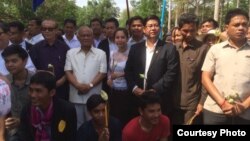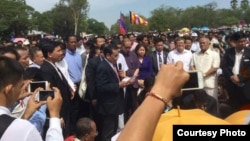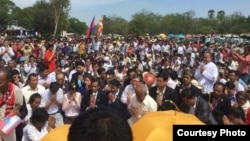About 20 opposition party officials on Sunday held a prayer ceremony at Angkor Wat in Siem Reap province calling for national reconciliation and the re-opening of dialogue with the ruling party.
Dialogue between the Cambodia National Rescue Party and Prime Minister Hun Sen’s Cambodian People’s Party has in recent months hit its lowest point since a disputed election in 2013 led to a year-long boycott of parliament by the CNRP.
Analysts this week said the prayer ceremony would do little to help the CNRP’s position, which they added was heading towards further stalemate with the ruling party.
Son Chhay, chief whip of the CNRP, said he hoped the ceremony would be a symbolic gesture that could lead to an easing of tensions.
“Whether or not we hope it succeeds, it’s what we normally do in the hope that it could lead to a change of mentality of politicians in order for them to come together to resolve the issues,” he said.
“Nevertheless, I hope that there is a possibility of talks.”
The ceremony came as the party’s deputy leader, Kem Sokha, remained holed up in the CNRP headquarters in Phnom Penh to avoid arrest after an investigation was launched against him by the courts over alleged solicitation.
Kem Ley, a formerly independent analyst who earlier this year founded his own political party, the Grassroots Democratic Party, said the ruling party had taken a “worrying” direction by pursuing the opposition through the courts.
“There's little chance that they will shift their stance. What I have observed recently is that they think that no matter how much the cost to investment is, peace should be maintained. They are not interested in multi-party democracy,” he said.
Cambodian expatriates have also raised concerns over the pursuit of the opposition and human rights workers through the courts, rallying earlier this month across cities in Europe, North America and Australia.
Heng Sreang, a social analyst, said the prayer ceremony was a list ditch attempt to foster negotiations.
A return to the so-called culture of dialogue between the two parties was of paramount importance, he added.
“The CNRP or any party should focus on development policies, such as how to provide water for the people’s rice fields. The farmers will then have water, budgets, markets and so on. They should help the graduates find jobs, reduce migration, and eliminate corruption and deforestation. Those are important matters,” he said.
CPP spokesman Sok Eysan told VOA that he had not received any formal approaches from the CNRP for talks, adding that even if negotiations were held discussion of the ongoing court cases would be off the table.
“I think that there is no [political division]. The political parties are disputing each other. It’s just the case of an individual who was found guilty. If he [Kem Sokha] committed a crime, he has to be responsible before the law. Praying to gods or goddesses or to the soul of Jayavarman VII will not help the one who did wrong. The gods or goddesses only help those who are doing good deeds,” he said, referring to a prominent ruler of the Angkorian Empire.









